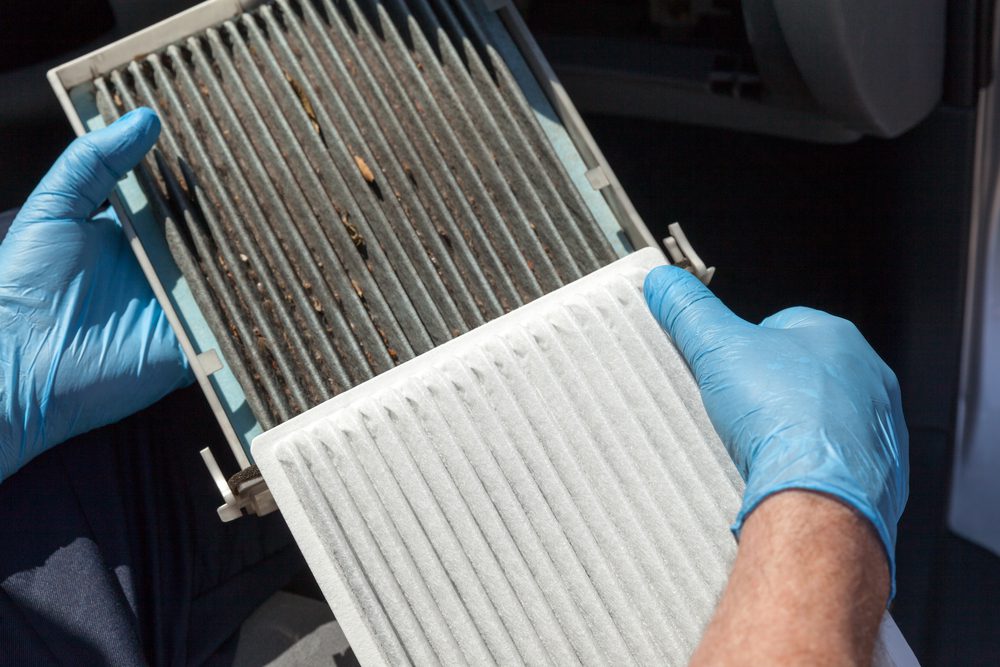In a time when the media often speaks about air pollution and the health benefits of clean air, it is hard to believe that most people, if they are driving a late model car, have more than likely never heard of the cabin air filter in their vehicle.
More so, the chances that most consumers probably don’t even know that a cabin air filter is in their car tells us filters are generally ignored and rarely mentioned by service advisors during the service walk around.
Given that it takes very little to explain the potential value and how important the issue of air quality and health are in today’s world, this is a costly mistake on the part of the Service Advisor.
The majority of vehicles manufactured after 2000, have a cabin air filter designed to filter all of the air that comes through the car’s HVAC system to prevent pollutants such as dust, pollen, smog and mold spores from entering the passenger cabin. The filters can also catch rodent droppings, leaves and other unwanted debris, as well as airborne pollutants that can make riding in a car unpleasant, especially if you have allergies, asthma or other respiratory problems.
Since many cabin air filters are located just behind the glove box, they are easily accessible by simply freeing the glove box compartment from its fasteners and the process usually does not require any tools. This makes it very easy to display to the customer when trying to demonstrate the need to replace one that is dirty or filled with dust and other particles.
Some cabin air filters are located under the hood where fresh air enters the climate control system or under the dashboard and may be a bit more difficult to reach. Regardless of where they are, they should be pointed out every single time to each customer as a part of their normal service walk around.
Another way to sell cabin air filters is to have five air filters at your desk each having the following miles: 12,000 miles, 24,000 miles, 36,000 miles, 48,000 miles and 60,000 miles. Then, based on how many miles are on the customer’s car, simply show them the cabin air filter closest to the mileage on their car. Inform the customer this particular cabin air filter was taken from a car with similar mileage and that their filter is almost certainly just as dirty.
Based on simple math, you should sell greater than 50 percent of your customers a new cabin air filter.
Cabin air filters are important to the well-being of the vehicle passengers and the vehicle itself and should be mentioned to a customer whenever they come in for regular maintenance or for a general check of the air conditioning system. Doing so not only lets the customer know that you care about their well-being, but it is a simple upsell that can add upwards of $100 to your service invoice and perhaps, a little extra commission to your own pocket.
Obviously, your customers would want to have clean air inside the car for themselves and their passengers, but most won’t know this is an option unless you tell them about it. Beyond the health and comfort benefits to the customer, a clean cabin air filter positively affects the way your car HVAC system works. A dirty cabin air filter makes a vehicles air conditioning and heating systems work harder and can cause them to stop working at all if they get completely clogged with debris.
This is another case in which most people don’t read their owners manual and don’t know about the cabin air filter and what the manufacturer recommends how often to change them. Most cabin air filters need to be changed every 15,000 miles, or about once a year.
Although most are sold during the spring because of an increase in pollen counts and how they affect allergy and asthma sufferers, winter is the more critical season to replace a vehicle’s cabin air filter. Cars left idling on cold winter mornings can pump out damaging emissions through their exhaust pipes that are harmful to the driver or passenger’s respiratory systems.
These dangerous emission pollutants usually range in size from two to 10 microns in diameter and can severely aggravate the lungs when inhaled. A working cabin air filter will easily catch these and keep them from going into the passenger cabin to be inhaled by those who are in the vehicle.
Service Advisors who don’t inform their customers about the value of regularly changing their cabin air filters are not doing them or their dealership any favors. Recommending an air filter change should be an upsell every time when customers come in for maintenance because the chances are they don’t even know anything about it.
Since car owners today drive their cars much longer and many more miles than they did 15 years ago, is very possible that someone with a 100,000-mile plus vehicle has never changed their cabin filter. Pull one out and show it to a customer and they will upsell themselves and wonder why no one ever told them about it before.
Female customers tend to be more in tune to the value of such things and are more likely to want to be informed about items that will produce harmful air coming into their vehicle. This is especially true in the case of women whose passengers often include children.
Always make sure to let your customer know about the cabin air filter and the benefits of changing them on a regular basis. They will not only want to do it once they learn of potential dangers, they will appreciate the fact that you told them about it. This can provide them a positive perception of you as a service advisor and of your dealership service department in general.








